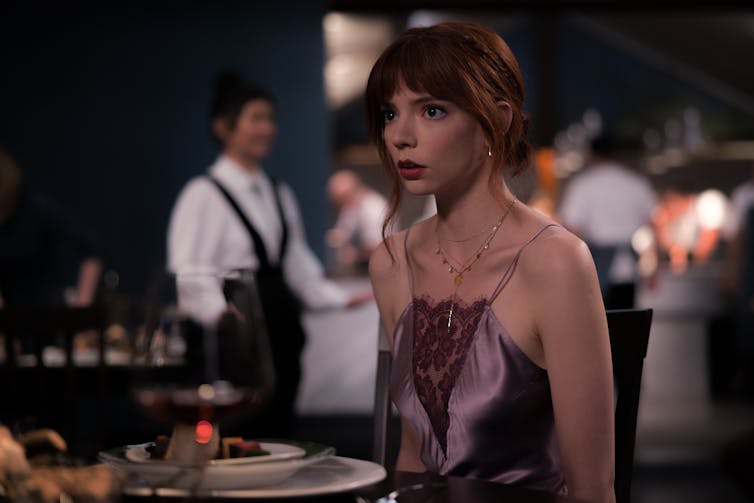Horror comedy ‘The Menu’ delves into foodie snobbery if you’re dying for a cheeseburger
This story comprises spoilers about ‘The Menu.’
The Disney+ release of horror/comedy The Menu marks the start of what’s already shaping up to be a reckoning year for the world of fine dining.
The movie, launched this previous fall, is directed by Mark Mylod, identified for producing and directing the acclaimed series Succession, and satirizes the tradition of high-end eating.
From the attitude of our combined expertise in food and literary studies and sexuality research, we’re curious about how the movie asks us to think about what’s left when even essentially the most basic bodily pleasures are become commodities: issues that may be marketed, purchased, and bought.
Gory confrontation
The Menu depicts a gory confrontation between overworked restaurant staff and elite diners on the unique and distant restaurant, Hawthorn. The restaurant is presided over by its celebrated government chef, Julian Slowik (Ralph Fiennes).
Critiques of The Menu typically concentrate on Hawthorn’s wealthy customers swooning over food, its extremely trained and obedient staff, or its meticulously and madly murderous chef.
Whereas these characters are compelling, they are also parodies. Probably the most excessive instance of that is foodie Tyler (Nicholas Hoult), who’s so determined to expertise the esteemed chef’s cooking that he goes to Hawthorn understanding that he (and all the others) will die there.
Whereas Tyler is absurdly entertaining, the movie follows the attitude of protagonist Margot, who isn’t conversant in the world of haute delicacies.
Margot isn’t just necessary as a result of viewers who don’t have a lot expertise with tremendous eating tradition, or who empathize with criticisms of it, can relate to her. Her perspective can be essential to understanding the movie’s fascinating and complex therapy of eating, labor, and pleasure.
Pretentious strategies
From the start, Margot balks on the restaurant’s pretentiousness and avant-garde strategies, like gelification.
Viewers would possibly determine together with her eye rolls and rude snickers, and will even do the identical when, for instance, a routine welcome speech delivered by the chef brings Tyler to tears.
These expressive responses from Margot add humor to the movie and present the ridiculousness of Chef Julian’s plans for what he calls “the best menu ever created.”
Giving and taking
In contrast to Hawthorn’s employees and common diners, Margot doesn’t simply match into the excellence the chef makes between “those who give” (service workers) and “those who take” (wealthy customers).
As we come to study, Margot can be working whereas at Hawthorn: she is a intercourse employee employed by Tyler, though he is aware of that it’ll imply her loss of life.
Just like the restaurant employees, Margot is subjected to the whims and needs of unbearable (and harmful) shoppers like Tyler, who don’t have any regard for the lives of the employees whose companies they make use of. On the similar time, Margot is a buyer of the restaurant. She is the only real character who’s each serving and being served.

Consuming and sophistication standing
Margot can be distinct as a result of she doesn’t deal with meals as an art object or a subject to master, nor does she eat to sign her class status. Her relationship to consuming is a extra carnal and tactile type of intimacy. Margot is hungry, and she or he calls for to be fed.
Others have pointed out how The Menu feedback on labor situations within the restaurant trade. That is actually an necessary matter the movie explores, and is especially relevant as eating places reckon with long-standing issues round trade sustainability that were sharply exposed during the COVID-19 pandemic.
For instance, given these labor points, there are questions on whether or not the tremendous eating trade ought to even exist sooner or later — questions which have develop into particularly public with the not too long ago introduced closure of Noma, Copanhagen, named the “World’s Best Restaurant” in 2021.
Invested staff
Nevertheless, Hawthorn’s employees is just not solely reducible to working-class warriors taking revenge on their oppressors. They, too, are invested within the tradition of tremendous eating and demand on the same type of perfection as their diners.

In an absurdly hilarious and grim tackle what tremendous eating has develop into, Hawthorn’s diners and employees carry out their roles — serving and being served, cooking, and consuming — to their fiery (and gelatinous) deaths.
Margot understands the pleasures which have been stripped from each cooking and consuming.
In a scene the place Chef Julian asks Margot if she enjoys her work, she says she used to, however now not does. Even so, not like among the others, she clearly nonetheless has a powerful urge for food for all times and residing.
Hungering for pleasure
By asking Chef Julian to make her a cheeseburger (as a result of she’s “nonetheless fucking hungry”), Margot each leverages her place as a buyer and reminds him of the pleasure of cooking a meal that somebody genuinely desires to eat.
She’s the one character who really fights for her life. It’s due to these needs (to stay and revel in life) that she is the one individual to depart Hawthorn alive, a scrumptious and fulfilling takeaway cheeseburger in tow.
Though the thought of being trapped on an island on the mercy of individuals expert with butcher’s knives is a daunting thought, The Menu’s actual horror comes from the methods meals, consuming, and cooking lose their carnal pleasures underneath capitalism. – The Dialog|Rappler.com
Melissa Montanari is a PhD Candidate in English and Cultural Research, McMaster College.
Marika Avenel Brown is a PhD Candidate and Educating Fellow, McMaster College.
This piece was originally published in The Conversation.
Source link
